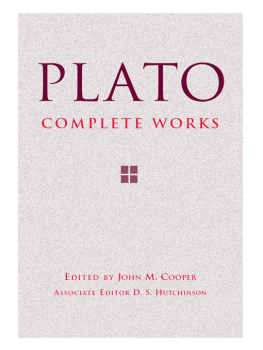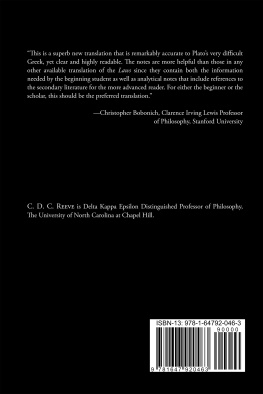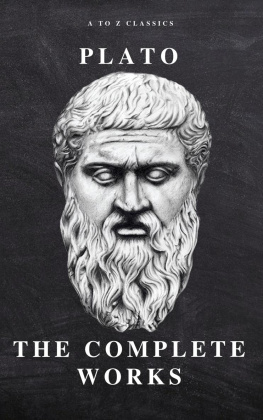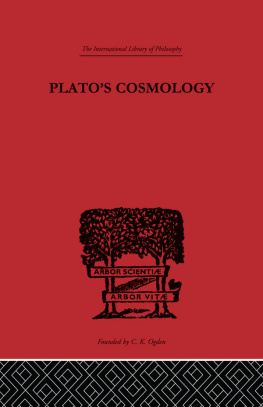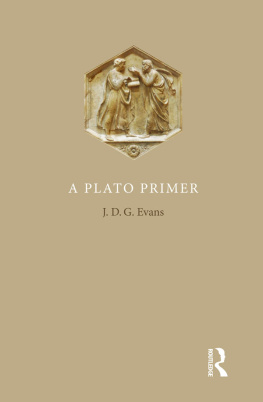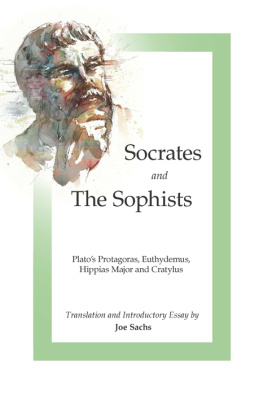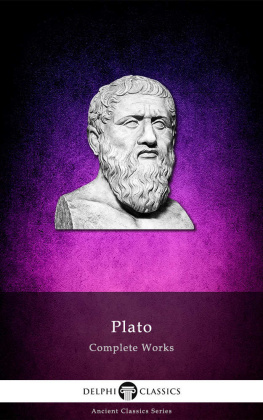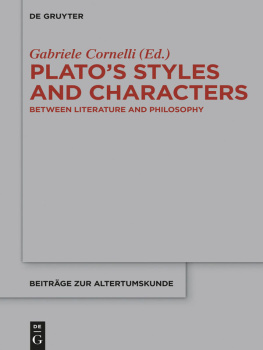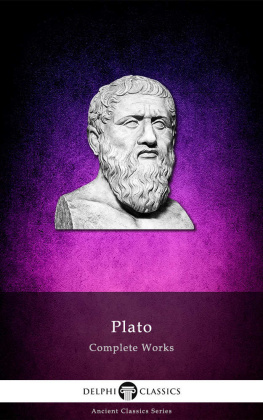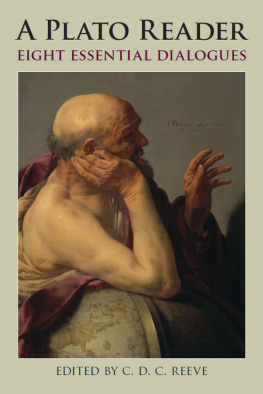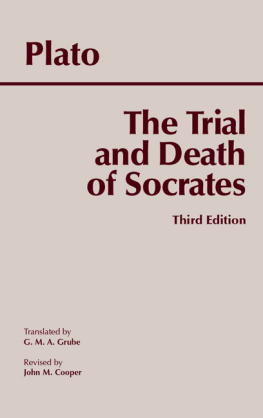PLATO
COMPLETE WORKS
PLATO
COMPLETE WORKS
Edited, with
Introduction and Notes, by
JOHN M. COOPER
Associate Editor
D. S. HUTCHINSON
H ACKETT P UBLISHING C OMPANY
Indianapolis/Cambridge
Copyright 1997 by Hackett Publishing Company, Inc.
All rights reserved
Printed in the United States of America
14 13 12 11 8 9 10 11
For further information, please address
Hackett Publishing Company, Inc.
P. O. Box 44937
Indianapolis, Indiana 46244-0937
www.hackettpublishing.com
Jacket design by Chris Hammill Paul
Text design by Dan Kirklin
Library of Congress Cataloging-in-Publication Data
Plato.
[Works. English. 1997]
Complete works/Plato;
edited, with introduction and notes, by
John M. Cooper;
associate editor, D. S. Hutchinson.
p. cm.
Includes bibliographical references and index.
ISBN 0-87220-349-2 (cloth: alk. paper)
1. Philosophy, Ancient.
2. Socrates.
I. Cooper, John M. (John Madison).
II. Hutchinson, D. S.
III. Title.
B358.C3 1997
184dc21
96-53280
CIP
ISBN-13: 978-0-87220-349-5 (cloth)
ePub ISBN: 978-1-60384-671-4
CONTENTS
Epigrams J. M. Edmonds, rev. John M. Cooper
Names listed are those of the translators.
*It is generally agreed by scholars that Plato is not the author of this work.
It is not generally agreed by scholars whether Plato is the author of this work.
As to Platos authorship of the individual Letters and Epigrams, consult the respective introductory notes.
Since they were written nearly twenty-four hundred years ago, Platos dialogues have found readers in every generation. Indeed, in the major centers of Greek intellectual culture, beginning in the first and second centuries of our era, Platos works gradually became the central texts for the study and practice of philosophy altogether: in later antiquity, a time when Greek philosophy was struggling to maintain itself against Christianity and other eastern wisdoms, Platonist philosophy was philosophy itself. Even after Christianity triumphed in the Roman Empire, Platonism continued as the dominant philosophy in the Greek-speaking eastern Mediterranean. As late as the fifteenth century, in the last years of the Byzantine empire, the example of George Gemistos Plethon shows how strong this traditional concentration on Plato could be among philosophically educated Greeks. but from the fifteenth century onwards, through the revived knowledge of Greek and from translations into Latin and then into the major modern European languages, Platos dialogues resumed their central place in European culture as a whole. They have held it without interruption ever since.
In presenting this new edition of Platos dialogues in English translation, we hope to help readers of the twenty-first century carry this tradition forward. In this introduction I explain our presentation of these works (Section I), discuss questions concerning the chronology of their composition (II), comment on the dialogue form in which Plato wrote (III), offer some advice on how to approach the reading and study of his works (IV), and describe the principles on which the translations in the volume have been prepared (V). But first, a few basic facts about Platos life and career.
Plato, a native Athenian, was born in 427 B.C. and died at the age of eighty-one in 347. He belonged, on both his mothers and fathers side, to old and distinguished aristocratic families. At some point in his late teens or early twenties (we do not know when or under what circumstances), he began to frequent the circle around Socrates, the Athenian philosopher who appears as the central character in so many of his dialogues and whose trial and death he was to present so eloquently in his Apology and his Phaedo. In the dozen years or so following Socrates death in 399, Plato, then nearly thirty years old, may have spent considerable time away from Athens, for example, in Greek-inhabited southern Italy, where he seems to have met philosophers and scientists belonging to the indigenous Pythagorean philosophical school, some of whose ideas were taken up in several of his own dialogues, most notably, perhaps, in the Phaedo. In about 388 he visited Syracuse, in Sicilythe first of three visits to the court of the tyrants Dionysius I and II during his thirty-odd-year-long engagement in Syracusan politics. This involvement is reported on at length in the Platonic Letters, included in this edition. At some point, presumably in the eighties, Plato opened a school of higher education in the sacred grove of Academus, in the Attic countryside near Athens, apparently offering formal instruction in mathematical, philosophical, and political studies. He seems to have spent the rest of his life (except for the visits to Syracuse) teaching, researching, and writing there. Under his leadership, the Academy became a major center of research and intellectual exchange, gathering to itself philosophers and mathematicians from all over the Greek world. Among its members was Aristotle, who came as a student in about 367 at the age of eighteen and remained there as teacher, researcher, and writer himself, right up to the time of Platos death twenty years later.
I. The Canon of Thrasyllus
These Complete Works make available a single collection of all the works that have come down to us from antiquity under Platos name. We include all the texts published in the early first century A.D. in what became the definitive edition of Platos works, that by Thrasyllus, an astrologer and Platonist philosopher from the Greek city of Alexandria, in Egypt. (For further details see the respective introductory notes to each of the translations.)
Especially given the often inevitably subjective character of judgments about authenticity, it is inappropriate to allow a modern editors judgment to determine what is included in a comprehensive collection of Platos work. The only viable policy is the one followed here, to include the whole corpus of materials handed down from antiquity. At the same time, it should be frankly emphasized that this corpusboth the works it includes as genuine and the text itself of the worksderives from the judgment of one ancient scholar, Thrasyllus. His edition of Platos work, prepared nearly four hundred years after Platos death, was derived from no doubt differing texts of the dialogues (and Letters) in libraries and perhaps in private hands, not at all from anything like a modern authors autograph. No doubt also, both in its arrangement and in decisions taken as to the genuineness of items and the text to be inscribed, it may have reflected the editors own understanding of Platos philosophy (perhaps a tendentious one) and his views on how it ought to be organized for teaching purposes. So, since the present editor has exercised his own judgment only to the extent of deciding to follow the edition of Thrasyllus, we are thrown back on Thrasyllus judgment in the works included and in their order and arrangement. Since Thrasyllus included all the genuine works of Plato that any surviving ancient author refers to, plus some disputed ones, we apparently have the good fortune to possess intact all of Platos published writings.
Thrasyllus order appears to be determined by no single criterion but by several sometimes conflicting ones, though his arrangement may represent some more or less unified idea about the order in which the dialogues should be read and taught. For example, the first four works (Euthyphro,Apology, Crito, Phaedo) manifestly follow internal evidence establishing a chronological order for the events related in themthe Last Days of Socrates. The conversation in Euthyphro is marked as taking place shortly before Socrates trial; his speech at his trial is then given in the
Next page
